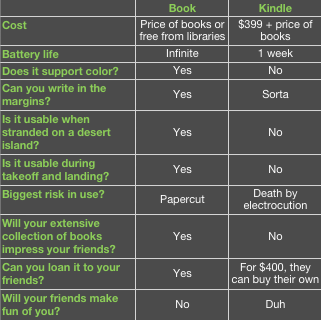Valleywag, the blog that tracks Silicon Valley and things tech, posted an amusing comparison between the traditional book and Amazon’s new electronic reader (see yesterday’s post). It’s clearly meant to be more witty than serious, but it makes some obvious and valid points along the way. (See Valleywag article here)
Amazon’s New eBook Reader is Out
 The Kindle, Amazon’s new eBook reader, is just now hitting the streets. The promo video below overviews its basic features, including the Kindle’s “paper-like” screen, ergonomic design, and free wireless access to content. As you’ll see, the $399 reader, which holds 200 books, promises to succeed where other digital readers have failed — to offer a satisfying reading experience and unlock the potentially large digital books market.
The Kindle, Amazon’s new eBook reader, is just now hitting the streets. The promo video below overviews its basic features, including the Kindle’s “paper-like” screen, ergonomic design, and free wireless access to content. As you’ll see, the $399 reader, which holds 200 books, promises to succeed where other digital readers have failed — to offer a satisfying reading experience and unlock the potentially large digital books market.
Not surprisingly, Amazon is backing the Kindle’s launch with a fair amount of marketing. Videos on the Amazon site feature Toni Morrison, a Nobel Prize Winner, talking up the Kindle. Then, there are these comments by Michael Lewis, a bestselling author, “It’s so simple you could be a moron and it works.” “It takes no intelligence at all. Anybody who can read a book can function with this thing.” “It’s easier on the eye than the printed word.” “[A]fter about — I’m telling you! — 5 minutes, you cease to think, ‘I’m looking at a screen.’ It’s not like looking at a computer screen.”
A notable downside to the Kindle (one that’s pointed out by ZDNet) is the cost to access content. Books usually go for $9.99 or less, which is perfectly reasonable. But you’ll pay $9.99 to $14.99 per month for newspaper subscriptions, $1.99 to $2.99 for monthly magazine subscriptions, and 99 cents per month to subscribe to individual blogs. This is all pretty illogical, given that most of this content is otherwise free on the web.
If you get your hands on the Kindle, definitely let us know what you think.
Watching Wikipedia Get Written in Real Time
The creativity associated with Wikipedia never ends. If you click here, a program called WikipediaVision will show you a Google map that displays in real time who is writing/editing what Wikipedia entry across the globe. Cool mashup. (Source: The New Scientist.com)
Related Content:
Information R/evolution: The New Video
Earlier this year, Michael Wesch, an assistant professor of cultural anthropology at Kansas State, released a smart video that immediately went viral on the internet. It was called Web 2.0… the Machine is Us/ing Us and it cleverly explained the often vague concept of Web 2.0 and why it matters. Now Wesch has launched another video under the title Information R/evolution (see below). Influenced by the recent book, Everything Is Miscellaneous: The Power of the New Digital Disorder, Wesch’s new clip offers a creative look at how the digital age fundamentally changes our relationship to information and how information gets organized. Have a look.
Amazon Goes Head-to-Head with iTunes (and How to Get iTunes Freebies)
 The digital music market is big, and so far Apple has owned it. But now Amazon may be quickly emerging as a viable competitor.
The digital music market is big, and so far Apple has owned it. But now Amazon may be quickly emerging as a viable competitor.
Tuesday, Amazon launched Amazon MP3, which gives you access to 2 million songs and more soon to come. Amazon’s product has several nice advantages over iTunes. Let’s list them briefly:
- It delivers songs in MP3 format, not a proprietary format, with the real plus being that you can play songs on any music player — the iPod, the Zune, you name it.
- There are no digital rights management (DRM) restrictions, so you can take the music you buy and download/burn it to CDs. And it doesn’t expire.
- The songs have better sound quality on average.
- And the prices are generally lower. Many songs go for 89 cents; while many albums are in the $5.99 to $9.99 range, and the 100 best-selling albums are all under $8.99.
Give Amazon MP3 a hard look and, for more details, check out these reviews — here, here, and here.
Related Note: From Oct. 2 to Nov. 7, Starbucks will be giving away 50 million free digital songs to help promote a new wireless iTunes music service that’s being rolled out in conjunction with the recent release of Apple’s iPhone and iPod Touch. Songs by 37 artists will be featured. Artists include Paul McCartney, Joni Mitchell, Dave Matthews, John Mayer, Annie Lennox and Bob Dylan. Get more info here.
Keeping Wikipedia Honest
Wikipedia is now the 9th most frequented site on the web, and it hosts over 7 million articles in over 200 languages. Like it or not, Wikipedia is here to stay.
Recognizing this, some innovative programmers have started developing ways to shore up Wikipedia’s sometimes shaky foundations. In particular, they’re finding ways to monitor Wikipedia entries for tampering and partisan manipulation. A couple weeks ago, we mentioned a new site called Wikipedia Scanner, which allows users to determine whether partisans have edited particular wiki entries by matching the entries against IP addresses. Now, another site, Wikirage, lets you track the pages on “Wikipedia which are receiving the most edits per unique editor over various periods of time.” This is a nice feature partly because it pinpoints which topics/entries are generating buzz at the moment (today it is Blackwater USA, Michael B. Mukasey, Fred Thompson, the United States Constitution and Dane Cooke — a logical sequence, to be sure.) But Wikirage is also handy because it highlights which entries “have high revision, vandalism or undo rates.” The upshot is that millions of people have built Wikipedia. But it’s smart programming, mixed with some manpower, that’s keeping the whole enterprise a little more honest and reliable. Stay tuned for more on how this works out.
See Lifehacker for the 10 Top Wikipedia tricks, and to find the most popular pages on Wikipedia in absolute terms, click here.
The New iPod Lineup Versus Its Rivals
 Since we talk a lot here about podcasts and mp3 files, it seems worth flagging this Yahoo gadget review that pits the new iPod lineup against its rivals. Here, we’ve got the new iPod Touch v. the Samsung Yepp YP-P2; the new Nano (with video) v. the Sansa View, and the iPod Classic v. Microsoft’s Zune. The net result is that the new iPods come out ahead, but not by much. Get review here.
Since we talk a lot here about podcasts and mp3 files, it seems worth flagging this Yahoo gadget review that pits the new iPod lineup against its rivals. Here, we’ve got the new iPod Touch v. the Samsung Yepp YP-P2; the new Nano (with video) v. the Sansa View, and the iPod Classic v. Microsoft’s Zune. The net result is that the new iPods come out ahead, but not by much. Get review here.
(For another review of the new iPod Touch, have a look at this piece on Gizmodo.)
Quick note: As part of the new lineup, the iPod Classic features a new 160 GB model for $349. It apparently holds 40,000 songs (twice as many as the previous model), which translates to three continuous months of listening entertainment. Imagine how many mind-expanding podcasts that could include.
Life-Changing Books Now on Google’s “My Library”
A few weeks ago, our readers contributed to creating a list of books that left an indelible mark on their lives. You can review the original post here. But we figured why not add them to our “My Library” page on Google, a new product that we briefly mentioned yesterday. You can access the collection here (or get it by rss feed). And, as you’ll see, we also imported to the list all of our users’ comments on the individual books. Explore the list, find a great read, and pass it along to a worthy friend.
Related Content:
Download over 100 classic audiobooks as free podcasts, or learn over 25 foreign languages with, yes, more free podcasts.


